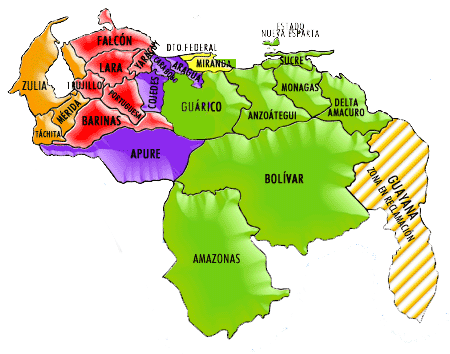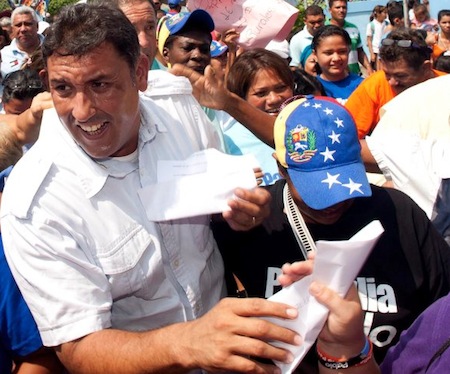With Venezuelan president Hugo Chávez recovering from surgery, due to what may be terminal cancer, it’s easy to forget that this weekend will mark a handful of key regional races throughout Venezuela, including a gubernatorial race in Miranda state that pits Chávez’s former presidential rival against Chávez’s former vice president.![]()
![]()
![]()
Although the attention this week has been mostly on Chávez’s health, his departure to Cuba for surgery and, perhaps above all, his speech last Saturday night indicating that his preferred successor is former foreign minister and vice president Nicolás Maduro, the results of Sunday’s races will establish the backdrop for the leading figures of both Chávez’s Partido Socialista Unido de Venezuela (PSUV, or United Socialist Party of Venezuela) and the broad opposition coalition, the Mesa de la Unidad Democrática (MUD).
Indeed, with rumors flying of complications after his surgery, the weekend’s races have counterintuitively become more important as Venezuela prepares for the possibility, at least, of a new early presidential election if Chávez resigns or dies in office.
In their own right, however, because 20% of the federal budget is (theoretically) allotted to state governments, governorships provide the MUD and other opposition candidates a platform for government, notwithstanding the centralization of Venezuela’s federal system under PSUV rule.

The key race that everyone will be watching is the governor’s race in Miranda, where the incumbent, Henrique Capriles, recently finished his unsuccessful presidential campaign against Chávez as the MUD’s standard-bearer — although he lost by 9 points, Capriles won 45% of the vote, making him Chávez’s most successful political opponent in his 13-year reign. Miranda state is likely Venezuela’s most developed state and its second most populous, bordering (and in some cases including) the broad Caracas metropolitan area. Chávez actually won this state in the October presidential race by a squeaker — with 49.96% to Capriles’s 49.52%, and Capriles won the 2008 election with just over 52% of the vote.
His opponent is the somewhat humorless former vice president, Elias Jaua, and although one poll has shown Jaua with a five-point lead against Capriles, other polls have shown varying Capriles leads and it’s certainly difficult to believe Capriles is an underdog. By all accounts, the fresh-faced Miranda governor has been a more-than-capable administrator in the past four years, bringing a dose of good government to Miranda after the corruption of his predecessor, Diosdado Cabello. Furthemore, Jaua’s record as a colorless Chávez yes-man makes it seem like he’s less than likely to sweep to victory, although if Chávez’s health takes a serious turn for the worst between now and Sunday, Jaua may yet benefit from a vote of sympathy.
Capriles defeated Cabello, the governor from 2004 to 2008, in the prior election, and Cabello, who’s since become the leader of Venezuela’s PSUV-dominated National Assembly, would temporarily take over as president in the event that Chávez resigns or dies after he is sworn in for his next term (set to begin January 10), with a snap presidential election to follow within 30 days. Despite Chávez’s speech anointing Maduro as his preferred successor, Cabello has long harbored presidential ambitions, he, along with Jaua (especially if Jaua wins) may try to become the PSUV’s presidential candidate in any such election instead.
Of course, in the event of such a rapid election, Capriles is very likely to lead the opposition against Maduro, Cabello or whomever the PSUV runs. But that could change if Capriles doesn’t win Sunday’s vote in Miranda handily — given his narrow loss to Chávez and the very short 30-day window for a new presidential election, Capriles may nonetheless still be the main opposition candidate. But it would open the door for another candidate to emerge, likely from among the other six states where opposition governors are currently in power.
That brings us to Zulia state and with 3.8 million people, it’s Venezuela’s most populous. Nestled in Venezuela’s far northwest bordering Colombia along the Caribbean coast, Zulia’s oil and agricultural wealth makes it, like Miranda, one of the country’s wealthiest states. Pablo Pérez (pictured above, top), who widely lost the MUD’s presidential nomination to Capriles by a 2-to-1 margin way back in February 2012, is running for reelection in what should be an even more solid opposition win for Un Nuevo Tiempo (UNT, a New Era), the centrist party that was founded in Zulia in the late 1990s and which has controlled the governor’s office since 2000 (until 2008, under Manuel Rosales, who lost the 2006 presidential election against Chávez by a 25-point margin). Pérez is running against the PSUV’s Francisco Arias Cárdenas, governor of Zulia from 1995 to 2000, though Pérez is heavily favored. Capriles did better in Zulia than he did nationwide in October, winning 46.27% to just 53.34% for Chávez. Both Chávez’s national government and Pérez’s UNT regional government have spent large sums on social programs in the state, and a win for the PSUV would be quite a staggering victory for chavismo.
If Capriles falters in Miranda, Pérez, who lies politically to the left of Capriles, could well become the next consensus opposition presidential candidate.


